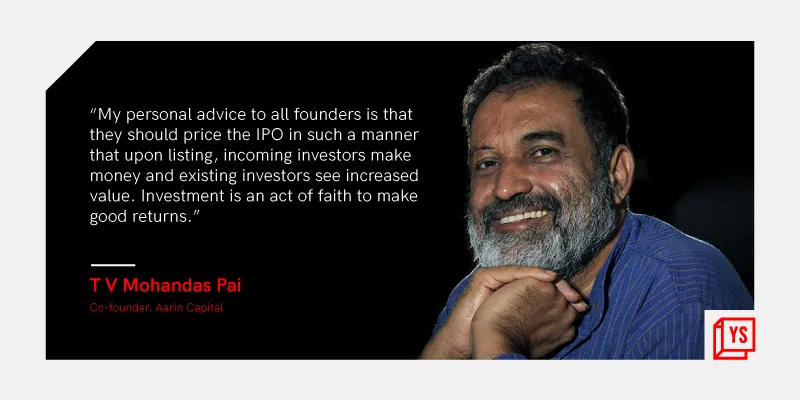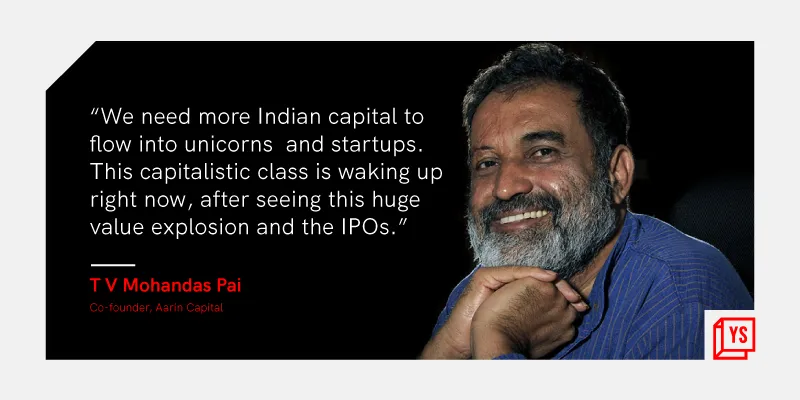India will have 1 lakh startups with $1T value and 200 unicorns by 2025, says Mohandas Pai
TV Mohandas Pai, Co-founder of Aarin Capital, tells YourStory why he thinks India will have more than 1 lakh startups by 2025, what startups going public mean for the ecosystem, and the valuation versus value creation debate.
The funding inflow into the Indian startup ecosystem is at an unprecedented high, with stock markets also providing an overall positive response to startups that have gone public. Amidst this euphoria, there is also an element of caution on the valuation of startups.
However, TV Mohandas Pai, Co-founder of Aarin Capital, believes the future is extremely bright for India’s startup ecosystem, with the country poised to have more than one lakh startups creating a value of $1 trillion by 2025.
In an interview with YourStory, Mohandas Pai says we will see many IPOs from unicorns in the next few years as “they have to give exits to the investors and also raise fresh capital”. He proffers his views on what startups going public mean for the ecosystem, the valuation versus value creation debate, and more.
Edited excerpts from the interview:
YourStory: How do you view the present funding environment for the Indian startup ecosystem?
Mohandas Pai: India is seeing enormous growth with the presence of over 60,000 startups, who have created more than $400 billion in value and 42 unicorns. India got $70 billion in startup funding between 2014 and 2020. This year, till now we have got about $30 billion, and by end of December, I reckon India will have 45 unicorns, taking the total to 85.
By 2025, India will have more than one lakh startups creating a value of $1 trillion, with 200 unicorns creating 3.5 million jobs.
Today, they have created 1.5 million jobs. We are on the cusp of one of the greatest growth curves ever seen using technology. In fact, digital revolution is now the pre-dominant driving force for the world. We are seeing the impact driven by innovation, capital, and sheer excitement of entrepreneurs.
YS: What is your view on the record number of unicorns created in India this year?
MP: The pace of unicorn creation has accelerated, driven largely by the flow of capital from overseas and innovation. Of the $70 billion of capital that has come till December 2020, only 10 percent is from India. We are on track to becoming a digital colony by 2025 when we will have more than 200 unicorns creating $1 trillion of value.
We need more Indian capital to flow into unicorns and startups. This capitalistic class is waking up right now, after seeing this huge value explosion and IPOs coming in. In next few years we are going to see many IPOs from unicorns as they have to give exits to the investors and also raise fresh capital.
For many years, founders of startups and venture funds used to say that the Indian capital market lacks liquidity but we have seen in recent IPOs that there is huge amount of liquidity in India.
The capital markets are very vibrant and willing to invest in startups, provided they have a good business model and are able to explain this very well. It is a new asset class for many investors.
YS: The time taken to reach unicorn status for startups seems to have shortened. How do you view this development?
MP: Let’s be very clear. There is capital flowing from large VC funds as they see the opportunity for domination in the digital economy. They feel that by putting in enormous amount of capital they will be able to accelerate growth and dominate market before competition comes in. It is a new idea that is taking place within India.
I do not think anyone should be very worried about the steep rise in unicorn valuation. Investment is an act a faith between the investor and the company, with two parties to the transaction who are willing to work together. I do not think anyone outside the system should be very worried.
If the valuation is not realised, it is between the two parties and has nothing to do with public money. The investors in these unicorns are employing a portfolio approach to make sure there are returns and they are also great risk takers.

YS: Many feel that some founders are more interested in valuation rather than value creation. What do you think?
MP: Yes, it is true that many people have said founders have focused on valuation rather than value creation. Many founders think they are judged by the value they create for investors, and that comes from valuation as well as ability to raise capital. This is not going to disappear. In the history of capital markets, you will see valuation is key to IPOs.
The key thing they must discuss whether the value upon listing goes up or comes down. It should be done in such a manner that there is reasonable certainty there will be excess demand for the stock after market listing where it quotes higher than issue price. By leaving money on the table, one is not doing the incoming investor any favour; all you are doing is ensuring that the value goes up for existing investors.
My personal advice to all founders is that they should price the IPO in such a manner that upon listing, incoming investors make money and existing investors see increased value. Investment is an act of faith to make good returns. Post the listing, founders should understand that the continuum of performance is much more important than listing price.
YS: Are startups going public a sign of maturity for the Indian startup ecosystem?
MP: It is a sign of maturity. In private markets, it is a deal between groups or individuals, but an IPO is a reflection on how the economy and investors see the company.
There will be cycles where valuation will go ahead of value creation, with prices falling and rising. There will be cycles of three to five years though in private market the value could go up in 12-18 months because these are high-growth companies.
But everything changes in the public market. What you see in terms of valuation is not new to anybody. It is only new to those who have not studied what Indian technology companies have done earlier.
YS: How can startup founders and investors guard themselves against irrational exuberance?
MP: They should guard against unnecessary exuberance leading to high valuation. They should be cautious about extremely high optimism about growth as they need to understand the reality that economy is superior to everybody and humbles everyone over time. Nobody is bigger than the capital market or the economy.
Founders and investors should always look at sustained value creation; this comes only where there is growth. Also, these startups over a period of time should show positive cash flows. Investors are willing to give time to the startups to grow, which can create market dominance, annuity streams of revenues. But, at the end of the day, they do not want keep funding it; they want returns.
YS: How do you see the whole valuation exercise of startups?
MP: It is very difficulty to have models. Valuation is a price at which the investor is willing to buy and issuer is willing to sell. Listing is not a one-shot game and is part of process of continuous value creation.
Yes, there are factors external to these companies which can bring the price down but it has got nothing to do with them.
What is in their control is IPO price, value creation, good governance, transparency, and running the company efficiently. One cannot unnecessarily splurge as there is no unlimited pool of capital. It just does not exist.

YS: Is IPO the only exit route for startup founders or investors?
MP: The decision to go public or not is one that investors have to take. There are various reasons for this. Companies go public to get liquidity and valuation for existing investors who have been with them for a long period of time. Secondly, to raise more capital as the public market is better, and third to create value for founders and employees especially in terms of ESOPs. In private markets, in order of priority of liquidity, founders and ESOP holders rank very low. It is much more easier in public markets. There are many benefits of going public
YS: Are you seeing some ‘frothiness’ in the market?
MP: Whether the market is frothy or not depends on valuation and pricing. Personally for me, it is important to understand the difference between value and price. Price is what you demand and value is what one can create. For a startup after IPO, it is important that price holds up after listing as it builds confidence in the company.
Humility is an important attribute that founders should have. The more successful you become, the more humble you should be because the forces that give you value are much bigger.
Also remember there is a great fiduciary responsibility to millions of investors. Capital markets will bring in maturity much faster than what you believe.
Edited by Teja Lele







